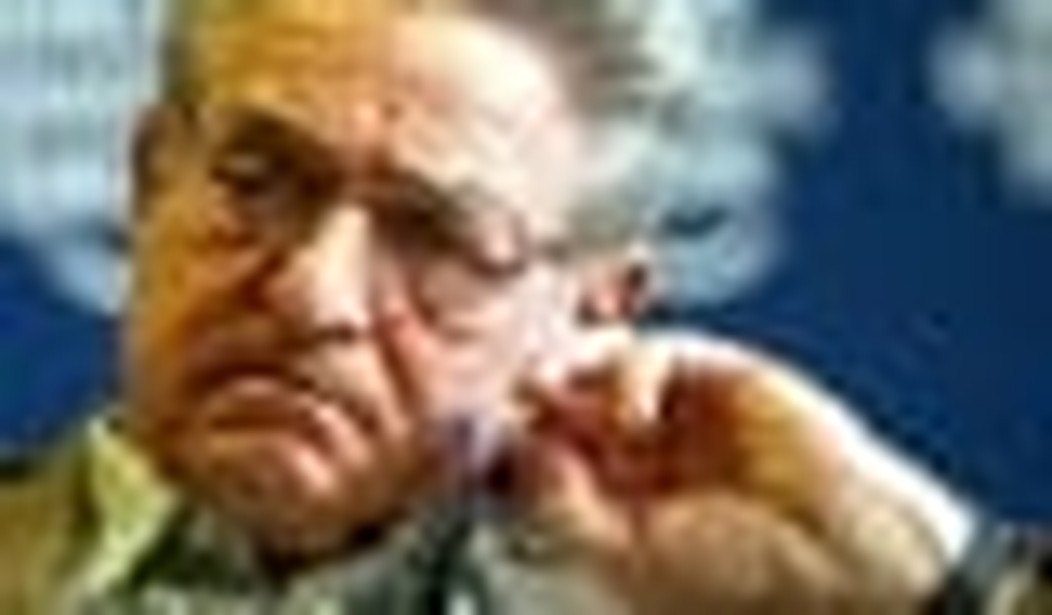George Soros has a Nazi problem. I don’t say that lightly. In fact, I regard those who go around calling people Nazis without substantial verification of such an allegiance to be either without conscience or without strong mental moorings.
So, who was the most prominent individual of the past decade to use the Nazi smear against another public person? That would be George Soros himself.
To refresh the national memory, let’s recall George Soros’ public “Bush is like Hitler” remarks, beginning in 2003. Laura Blumenfeld interviewed George Soros for The Washington Post and summed up Soros’ antipathy for Bush thus:
Soros believes that a “supremacist ideology” guides this White House. He hears echoes in its rhetoric of his childhood in occupied Hungary. “When I hear Bush say, ‘You’re either with us or against us,’ it reminds me of the Germans.” It conjures up memories, he said, of Nazi slogans on the walls, Der Feind Hort Mit (“The enemy is listening”). “My experiences under Nazi and Soviet rule have sensitized me,” he said in a soft Hungarian accent.
Soros’ first volley into the Bush-Hitler meme was quickly followed by a MoveOn.org ad campaign against then-President George W. Bush using actual WWII Nazi film footage, interspersed with Bush comparisons. As all aware Americans know by now, George Soros is the money bag that keeps MoveOn in business. The ad that appeared on MoveOn’s site melded an actual recording of Hitler with photos of Bush. “A nation warped by lies. Lies fuel fear. Fear fuels aggression. Invasion. Occupation. What were war crimes in 1945 is foreign policy in 2003,” the ad said. The public outcry was fast and furious, forcing MoveOn to remove the ad from its site and make piteous declarations of ignorance regarding its ever getting there in the first place. But the “Bush is Hitler” meme, begun by Soros’ himself, by then had strong legs throughout the Soros-influenced left wing.
Soros put more than $25 million of his own money into defeating George W. Bush in 2004, calling that mission the “central focus of his life.” Coming away with nothing but an “I supported the other guy” t-shirt, Soros went all in with Barack Obama. Not content, however, merely to back an alternate party candidate, Soros reiterated his “Bush is like the Nazi leader” mantra at Davos in 2007:
“America needs to follow the policies it has introduced in Germany,” he said. “We have to go through a certain de-Nazification process.”
So, again I say that George Soros has a Nazi problem.
At the moment, however, Soros is battling his Nazi problem from a wholly different angle.
You see, while George W. Bush had not even yet been born in 1945, when real Nazis were perpetrating the real Holocaust, George Soros, as a teenager, was actually helping real Nazis confiscate the real property of real, about-to-be-“exterminated” Jews in his native Budapest, Hungary.
And no, this actual Nazi collaboration by a young George Soros was not an obscure tidbit dug up by opposition researchers. George Soros freely admitted his actions in the now-infamous Steve Kroft interview of 1998. Soros was shocked that the interview was so upsetting to so many and endeavored greatly to put the controversy to rest by giving more details and explanations to his biographer, Michael Kaufman.
When Soros spoke with Steve Kroft in 1998, the huge question was whether Soros had felt any guilt over his acquiescence to the Nazis. It was Soros’ denial of any survivor’s guilt and his nonchalant “If I hadn’t been there doing it, then someone else would have” excuse that caught the discerning public eye at the time. And details added in his biographer’s ear did nothing whatsoever to diminish Soros’ inhumane diffidence regarding the sufferings of his fellow Jews during the Holocaust.
In fact, in the biography — aptly titled Soros, the Life and Times of a Messianic Billionaire — are scads of details that make Soros much more culpable than the Kroft interview. At age 72 — with 58 years for reflection — George Soros described his year of living under Nazi rule as “the most exciting time of my life.” That was the same year Soros’ own uncle, along with his wife and children, were “deported” to Auschwitz. But as Soros glibly recounted, his family had long ago abandoned Judaism — for a “cosmopolitan” pseudo-religion, for Esperanto, and for watching their fellow Jews, including family members, get carted off by the Nazis. It caused George no real grief. “We were somehow above them,” he told his biographer, his family having abandoned their “tribal” loyalties long ago.
No, neither the young George Soros nor his family were unaware of what was happening to their fellow Jews. Though the full extent of the Holocaust would not be known until war’s end, Soros confided to his biographer that “word of mass shootings, slave labor, and the Jewish rebellion in the Warsaw Ghetto became more and more frequent.” So when Nazi tanks rolled into Budapest in the spring of 1944, George and his family were not caught unaware.
When George’s family had traveled on holiday to Hitler-controlled Bavaria in 1939, they saw the “No Jews allowed” signs in restaurants and hotels for the first time. But George’s father answered his mother’s fears and protests with the nonchalant, “You’re a foreigner. It’s not for you.” Even so, George recalled, his mother was not reassured and continued to become more and more wary of the Nazis.
As well she should have been. Putting the plight of Hungary’s Jews in proper perspective requires a look at the numbers. Even though the war was all but lost in 1944, Hitler sent Adolf Eichmann himself to deal with Hungary’s “Jewish problem.” Eichmann arrived in Budapest a mere four days after the German tanks. In the span of only two months, German efficiency coupled with Hungarian collaboration managed to “deport” 437,402 Jews, and all but 15,000 went to Auschwitz. A full ¾ of all Hungarian Jews perished in the Holocaust; one in every three killed at Auschwitz was a Hungarian Jew.
Yet, even knowing all these gruesome details after the war, George Soros still described that year of the Hungarian Holocaust, during which his own hands had delivered “deportation” notices and confiscated Jewish properties, as “the most exciting time of my life.” Soros also told his biographer that for his family, the worst suffering had been their inability to obtain their preferred Titleist tennis balls. Concealing his Jewishness from the Nazis with forged identity papers? Why, that was “exciting,” a year of facing “danger, yet “getting the better of it,” of “being in command of the situation,” “maneuvering successfully” and feeling “inviolate.” As George added, “what more could you ask for” at age fourteen?
Fourteen. Yes, it’s a young age. And George’s age at the time has been his best excuse for what most people would regard as a callous and inhumane lack of guilt over his own Nazi collaboration.
However, modern people ought not judge Soros’ 1944 actions by the level of maturity exhibited by American 14-year-olds today.
The truth is that George Soros was 14 years old in 1944, not 2004. And at the same time that George Soros was having the “most exciting time” taking care of nothing more substantial than his own survival at any cost, other 11, 12, 13 and 14 year olds were actually fighting as soldiers in the war.
Not only were child soldiers being used in actual combat, but the valiant uprising in the Warsaw Ghetto — the one George’s family had heard about in 1943 — saw a great many children fight heroically against the Nazis. Resistance fighters throughout the Nazi-occupied territories welcomed child warriors and many played vital parts. Hitler was employing his own youth squads in tank battalions, drafting children as young as twelve. These German child soldiers were matched and often bettered in real battle by Jews and gentiles of the same ages. So for George Soros to use his youth as some sort of blanket apologetic for what many regard as unapologetic collaboration with evil is quite beyond the pale.
Soros has often spoken of his father’s rejection of Judaism as the thing that framed his own conscience development, but even that is a half-truth at best. Young George Soros was both mature enough and independent enough at age 12 to seek his own answers regarding the faith of his grandfathers. George undertook Yeshiva schooling on his own, against the admonitions of his father, learning about his Jewish history and the tenets of Judaism, even having his own bar mitzvah at age 13.
He promptly abandoned Judaism, however, concluding that man “had created God in his own image.” Fine. That was his personal choice. But he cannot now claim that during the war, he knew not what he was doing. He knew very well; he had learned from the rabbis of Budapest — the same rabbis who were put to death by Eichmann with a lot of help from Hungarian Jews, like George Soros.
It ought not go without mention, too, that as soon as Soviet forces “liberated” Budapest, George and his father immediately set about capitalizing on their fellow Hungarians’ desperate straits. George’s “sense of exhilaration” accelerated in 1945. The year was for George “as exciting and interesting — in many ways even more interesting and adventurous — than the German occupation.” That was the year George Soros first began his financial ventures and currency trading in the flourishing black market.
George’s father would send him to a crowded café, the center of Budapest’s black market, to “change money and trade jewelry” — because a 15 year old “was less likely to arouse suspicion than an older man.” And this currency trading, for which Soros has now become quite infamous and which has made him quite rich, was conducted with the same insouciance with which Soros treats his own former Nazi collaboration.
Whenever one thinks of George Soros, one ought never forget that his own conscience is made from a wholly indifferent cloth. As Soros wrote himself in 1995, in his book, Soros on Soros, “I do not accept the rules imposed by others.” No, Soros plays by his own rules. And as he shamelessly recounts his cunning survival during WWII and his money-changing exploits at war’s end, the only lesson he took from it all was that what counts in life is one’s own survival and “trying to come out on top no matter what happens around you.”
When Jews are being “deported” to death camps, Soros says, I am “above them.” What’s that to him? If “I was not doing it, then someone else would be doing it.” When life savings of hard-working people depend upon the value of their currency, Soros trades with the same nonchalance. His only goal is to save himself, promote himself, and enrich himself.
Oh, and lest we forget, Soros’ main life objective, as he told his biographer, is to “become the conscience of the world.” If Soros’ own conscience is the guide, who would wish to live in that world?









Join the conversation as a VIP Member